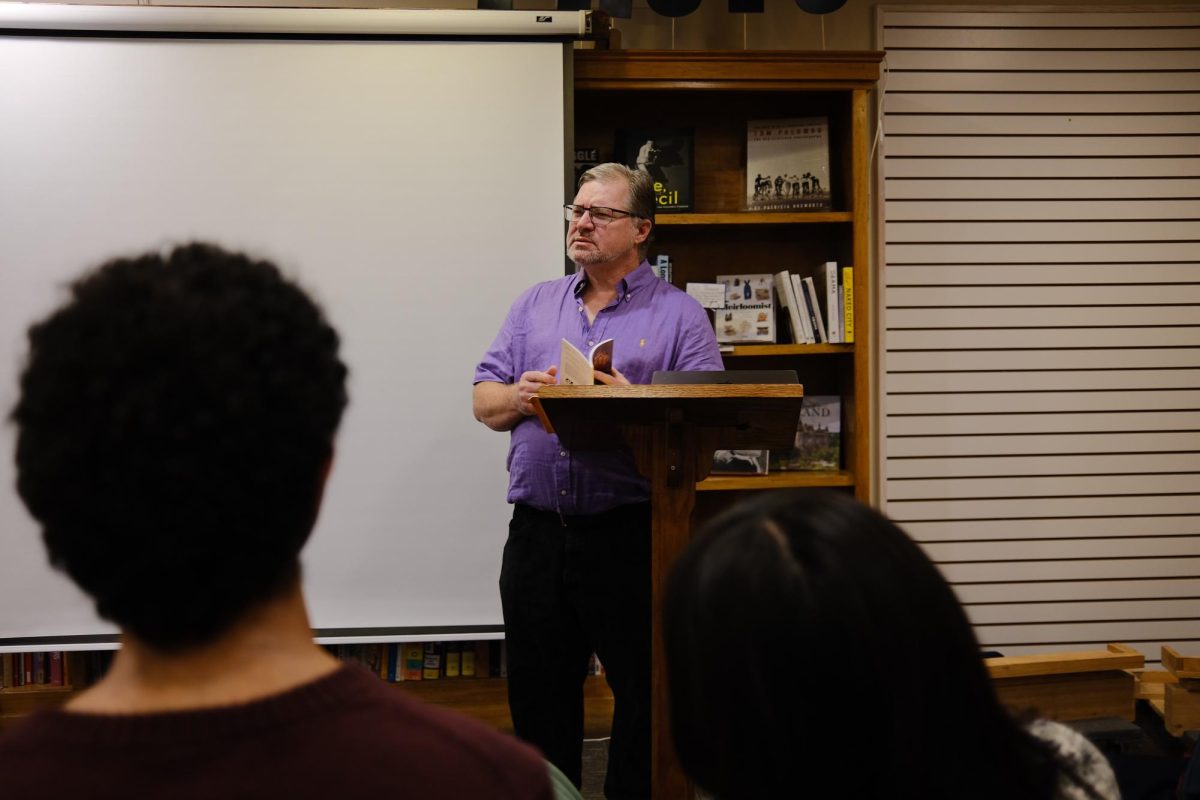Tuesday, Nov. 19: In between the Book Stall’s shelves that were packed full of material from aged grain to aged grain, there is a nestled cove with rows of mismatched chairs and benches, all huddled around a projector. The warmth of the room is highlighted by the blistering Chicago weather that we all know and tolerate.
The door jingles every other minute or so, with people streaming in of all ages, a sense of familiarity ever-present. They file in, sounding off greetings and settling in as an employee of the store fiddles with the projector. In the midst of it all, New Trier High School English teacher John O’Connor presents his new book, “Natural Consequences.” It’s the third haiku book that O’Connor has published, with this addition covering a wide array of topics: O’Connor’s observings of his surroundings, the environment around him, his past, and his relationships with his family.
In a way, it’s an evolution of the years of writing and living that O’Connor has done, a culmination of his experiences as a teacher and as a man.
“I always ask the students to do the writings I think is exciting, and I always do every assignment that I ask my students to do,” O’Connor says. “That keeps me in the game, even when I’m teaching.”
The introduction into O’Connor’s mind begins when the initial poem is read. It is called “Afterthought: Autumn,” and it paints a picture of who O’Connor is as a writer. The poem is punctuated by distinct pauses and a unique rhythm emphasized by the use of alliterations or similar-sounding phrases, ultimately serving as a prelude to what would be an avalanche of haikus from the book. Each one is defined by its unique emphasis on certain words, with O’Connor repeating poems in order to highlight different things. The topics range from funny jokes and introspective observations to solemn tributes to brothers and fathers, generating an emotional whiplash.
But O’Connor is not alone in presenting. He is joined by Elle Kittikamron-Mora, a junior and a member of the Poetry Club that O’Connor sponsors. She presents her own poem, “Chronicle of an Election Foretold,” which speaks about politics in America. Kittikamron-Mora was inspired by the similarities between “Chronicle of a Death Foretold” and the election, scrapbooking phrases from her class essay on the novel into the presented poem.
She cites her time in the Poetry Club as a major point of improvement, specifically the influence that O’Connor brings to the club.
“Mr. O’Connor studied at UChicago, so he brings this professional view to writing, which helps because I would describe my writing as raw,” Kittikamron-Mora says.
But the most unique portion of the event comes later when Anaya Brainch, a junior and a former student of O’Connor, presents a haiku movie entitled “Carrington.” This experimental presentation combines music composed by Brainch herself punctuated by the voice of O’Connor reading out a selection of these poems. The movie itself includes a series of images and clips that are all connected to the haikus, the combination of these elements developing a message that allows the haikus and their soul to truly shine.
Of course, the creative process for these films could be their own article in itself, but due to the nature of the movies, Brainch collaborated with O’Connor heavily, combining her vision of the haikus with his own desires in a process that involved a lot of time and communication.
“You just have to have your voice and come to a compromise, because as an artist I think the last thing you want to do is to get rid of your creative vision but you have to understand that you are making this for something else,” Brainch says.
Throughout the night, the more that works are read and played, the more that the creativity of the artists begins to unfurl and reveal itself. However, the arduous work behind the writing and the film in the creative process must also be acknowledged. In the same vein as their art, the steps of creativity have developed into unorthodox, unique processes which suit the mediums that both O’Connor and Brainch have chosen.
The process certainly shines through when, to end it all, O’Connor sings two songs and invites the audience to sing along with the chorus. It is an odd, perfectly in-character, an emotional rousing end to the night, a microcosm of the entire event and all that was revealed.
With such a variety of topics covered, it’s hard to single out a particular influence. But to O’Connor, everything points back to his youth.
“I think it’s kind of everything,” O’Connor says. “Louise Gluck, the Nobel Prize winning American poet who died recently said that we experience the world once as a child, everything else is memory, and that’s kind of what I’m still living, still trying to figure out those memories.”









































